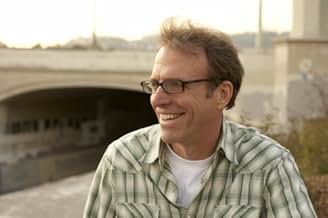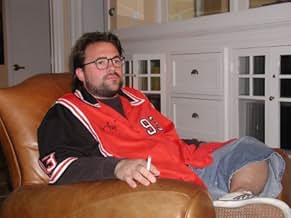AVALIAÇÃO DA IMDb
7,4/10
29 mil
SUA AVALIAÇÃO
Adicionar um enredo no seu idiomaKirby Dick's exposé about the American movie ratings board.Kirby Dick's exposé about the American movie ratings board.Kirby Dick's exposé about the American movie ratings board.
- Direção
- Roteiristas
- Artistas
- Prêmios
- 4 vitórias e 3 indicações no total
Clark Baker
- Self - Private Investigator
- (as Clark)
- Direção
- Roteiristas
- Elenco e equipe completos
- Produção, bilheteria e muito mais no IMDbPro
Avaliações em destaque
America is the land of the free, so in order to constrain people to do what you want them to do, you have to let them think it's their choice. How do you do that? You create a completely anonymous committee, supposedly composed of concerned parents, to rate the films that appear and, depending on that rating, they will get more or less media coverage, distribution, target audience size. You also finance this body with the money of the seven largest film studios in the US. This functioning censorship committee is called the MPAA.
The film is highly biased, to a point where it gets a little annoying, but the information contained in it is sound, proved and makes one think about the way public opinion is manipulated, ever so slightly, towards a desired average point of view. If you ever wondered how Americans can seem so ordinary, yet have completely different opinions about the same subjects as any other people, then this movie will answer part of that question. Very insightful is the presentation of the seven major film studios who own 95% of the American film industry, parts of larger conglomerates that own 90% of all mass-media. Also interesting, the role of the clergy in movie rating. Yes, I did say clergy, as in priests. In the appeals commission there are always an episcopalian priest and a catholic one. No other religions get to add their input.
A must see movie, not a conspiracy theory film, but certainly one that is against the system. The system here being the absurd movie rating system of the MPAA.
The film is highly biased, to a point where it gets a little annoying, but the information contained in it is sound, proved and makes one think about the way public opinion is manipulated, ever so slightly, towards a desired average point of view. If you ever wondered how Americans can seem so ordinary, yet have completely different opinions about the same subjects as any other people, then this movie will answer part of that question. Very insightful is the presentation of the seven major film studios who own 95% of the American film industry, parts of larger conglomerates that own 90% of all mass-media. Also interesting, the role of the clergy in movie rating. Yes, I did say clergy, as in priests. In the appeals commission there are always an episcopalian priest and a catholic one. No other religions get to add their input.
A must see movie, not a conspiracy theory film, but certainly one that is against the system. The system here being the absurd movie rating system of the MPAA.
Alright, let's just say it right from the start: the MPAA sucks. They make good films turn into films that are hacked up just to fit their 'moral' agenda, and they are the bane of the existence of Hollywood filmmakers. Being from Canada, I have the benefit of a much fairer system, but one that is affected by the MPAA nonetheless. So when a film like This Film is Not Yet Rated comes out, I definitely become interested. And interesting is what this film is.
The documentary is about the NC-17 rating primarily, and the people and groups fighting against it. When it is not showing interviews and clips about the horror stories in trying to get director's films cut to a suitable R or PG-13 rating, it is about director and star Kirby Dick's hired private investigators trying to get the names of the members of the MPAA ratings board.
Watching the film is a bit of an on and off experience.
On because the interviews with directors like Kevin Smith, Atom Egoyan, Jamie Babbit, Matt Stone, and Wayne Kramer are absolutely fascinating to listen to. They talk about the troubles they had with the MPAA, show the "obscene" footage from their films, and even offer some ideas as to how the MPAA can change for the better, rather than completely tear the company up to pieces. All of these clips are excellently edited together, and in some instances, offer some pretty amusing anecdotes. Seeing the offending clips from the films was also interesting, as just simply talking about them would defeat the purpose of the documentary itself (which thankfully, originally got an NC-17 for having the clips in the film).
These interviews also offer a lot of moments talking about the rules of the MPAA itself. Listening to how ridiculous some get can be hilarious, but it is also enlightening. For someone who is into film and only knows the basics of the MPAA, it offers a lot of information on the final process a movie has to go through before it makes it to the theatre. The clips offered a lot more information than I imagined, and they elevate the film greatly.
Another element I liked was showing the hypocrisies of the MPAA, and interview footage of former head Jack Valenti himself. It made the film feel a whole lot more complete, and gave it more of an authentic circular viewpoint. If they had simply just included the viewpoints of the filmmakers, journalists, authors, doctors and lawyers (like I half expected them to show), than they would not have nearly had as much credibility as they end up having. Of course, these moments are practically the funniest in the film, but they still offer plenty of intriguing insights. I think some comparisons to other country's film rating systems probably could have only enlivened this credibility even more.
Where I think the film fails and becomes off is in the almost obsessive search to find out the identity of the MPAA's raters. I understand that it is pivotal to the entirety of the film, but it just drags the film down into depravity and ridiculousness. It shows these moments in an amusing light, but they really are not that funny. They offer a bit too much information in some sequences (like blurring out license plate numbers, but having the private investigator say the numbers anyway), and the payoff just does not feel entirely proper. It does not have the intensity or the postmodern awareness that the interview clips do. They just feel kind of boring, and in some parts, unnecessary. Dick was already exposing the fraudulence and downright deceitful nature of the MPAA. Did he really need to go so far as to expose everything imaginable?
I am unsure of why it the exposing got to me so much, but it just did not feel totally right in a lot of cases. I liked how much dedication Dick and his crew had for the material, but it feels more like two different films than it does one cohesive whole. The information does not become overwhelming in any scene, but it does feel like overkill in some parts. The film is just over ninety minutes long, but it feels like it could have been trimmed. And most of that trimming could have probably come from scenes involving the private investigators. They just are nowhere near as interesting as the insight and horror stories offered in the interviews and film clips.
This Film is Not Yet Rated is an interesting documentary, and it offers a lot of insight that I seriously doubted it would. It is definitely a recommended watch for anyone who is interested in the film-making process, but for anyone else, it may just be something to casually watch part of and then turn off. I will hand it to Dick though. The final product is something I never thought the MPAA would have passed with any rating.
7.5/10.
The documentary is about the NC-17 rating primarily, and the people and groups fighting against it. When it is not showing interviews and clips about the horror stories in trying to get director's films cut to a suitable R or PG-13 rating, it is about director and star Kirby Dick's hired private investigators trying to get the names of the members of the MPAA ratings board.
Watching the film is a bit of an on and off experience.
On because the interviews with directors like Kevin Smith, Atom Egoyan, Jamie Babbit, Matt Stone, and Wayne Kramer are absolutely fascinating to listen to. They talk about the troubles they had with the MPAA, show the "obscene" footage from their films, and even offer some ideas as to how the MPAA can change for the better, rather than completely tear the company up to pieces. All of these clips are excellently edited together, and in some instances, offer some pretty amusing anecdotes. Seeing the offending clips from the films was also interesting, as just simply talking about them would defeat the purpose of the documentary itself (which thankfully, originally got an NC-17 for having the clips in the film).
These interviews also offer a lot of moments talking about the rules of the MPAA itself. Listening to how ridiculous some get can be hilarious, but it is also enlightening. For someone who is into film and only knows the basics of the MPAA, it offers a lot of information on the final process a movie has to go through before it makes it to the theatre. The clips offered a lot more information than I imagined, and they elevate the film greatly.
Another element I liked was showing the hypocrisies of the MPAA, and interview footage of former head Jack Valenti himself. It made the film feel a whole lot more complete, and gave it more of an authentic circular viewpoint. If they had simply just included the viewpoints of the filmmakers, journalists, authors, doctors and lawyers (like I half expected them to show), than they would not have nearly had as much credibility as they end up having. Of course, these moments are practically the funniest in the film, but they still offer plenty of intriguing insights. I think some comparisons to other country's film rating systems probably could have only enlivened this credibility even more.
Where I think the film fails and becomes off is in the almost obsessive search to find out the identity of the MPAA's raters. I understand that it is pivotal to the entirety of the film, but it just drags the film down into depravity and ridiculousness. It shows these moments in an amusing light, but they really are not that funny. They offer a bit too much information in some sequences (like blurring out license plate numbers, but having the private investigator say the numbers anyway), and the payoff just does not feel entirely proper. It does not have the intensity or the postmodern awareness that the interview clips do. They just feel kind of boring, and in some parts, unnecessary. Dick was already exposing the fraudulence and downright deceitful nature of the MPAA. Did he really need to go so far as to expose everything imaginable?
I am unsure of why it the exposing got to me so much, but it just did not feel totally right in a lot of cases. I liked how much dedication Dick and his crew had for the material, but it feels more like two different films than it does one cohesive whole. The information does not become overwhelming in any scene, but it does feel like overkill in some parts. The film is just over ninety minutes long, but it feels like it could have been trimmed. And most of that trimming could have probably come from scenes involving the private investigators. They just are nowhere near as interesting as the insight and horror stories offered in the interviews and film clips.
This Film is Not Yet Rated is an interesting documentary, and it offers a lot of insight that I seriously doubted it would. It is definitely a recommended watch for anyone who is interested in the film-making process, but for anyone else, it may just be something to casually watch part of and then turn off. I will hand it to Dick though. The final product is something I never thought the MPAA would have passed with any rating.
7.5/10.
Kirby Dick is a filmmaker I wasn't aware of before This Film is Noy Yet Rated, but now he is assuredly on my radar, if only for the determination in pulling off his main idea. Like Super Size Me, this documentary has a near-gimmick to it; Dick hires a private investigator in order to track down the anonymous "parents" who decide why a movie will be rated R over PG-13, and NC-17 instead of R. This even leads- more intriguingly- into the more deceptive group of appellant board members of the MPAA. So on the one hand the filmmaker has this extremely entertaining, guerrilla-style aspect to his film, with a hand-held camera in one moment in a fast-food place that draws attention to him, and detectives who will go to any length to get results. On the other hand he gets great interviews and clips and history about the film industry in the US and the near fascist style of the MPAA in relation to the several (corporite) studios.
As a film buff this film already had my interest long before I saw it. For too long the topic of film ratings have both infuriated and fascinated me. Much of what ends up going on with filmmakers's battles with the MPAA to get their R (and indeed the difference between millions of dollars in grosses) instead of an NC-17 is staggering. That Kirby Dick get such insight out of the insiders (two of which former MPAA people, and two who kept anonymous), filmmakers, business people, and other types within the industry, is a good help to add to the basic argument that there is some inherent problems with the current ratings system in the country. This is accentuated in comparisons between NC-17 and R rated sex scenes from other movies, and clips from films that received the NC-17- or close to it- and the inanities and problems filmmakers have to get their whole vision against people who, of course, are not that creative. There are issues of gay sex in movies, how violence is vs. sex in allowance in ratings, and in the end how big business (and religion) are behind the scenes if not pulling strings then giving complete influence.
All of this as a documentary ends up being pulled fantastically off, as it does at the core what a documentary mostly should- stir up conversation about the topic(s), and at the same time still being entertained to an extent. And Kirby Dick even has a slight Michael Moore tinge to him as he goes full-on after his subjects; one of which reminded me of Moore's own confrontation with Charleton Heston, as Dick puts himself in split screen with animated caricatures of his callers. But Dick also is smart enough to put such subject matter with good doses of humor. I loved the little animated explanation as to what each rating means (including dead orphan and Almodovar jokes), and as he revealed with a near relish the full facts on every member (most shockingly the appellate members). Even if you just have a casual interest in movies it should be worth your while, and especially if you're a parent- and try not to let the NC-17 rating deter you as it's in part just in spite of the mirror put up to the ratings board itself- it's especially prudent to see. It's got both tongue-in-cheek and dead-serious aspirations, and all the while making Jack Valenti look worse and worse. It's biased, to be sure, but for the right reasons.
As a film buff this film already had my interest long before I saw it. For too long the topic of film ratings have both infuriated and fascinated me. Much of what ends up going on with filmmakers's battles with the MPAA to get their R (and indeed the difference between millions of dollars in grosses) instead of an NC-17 is staggering. That Kirby Dick get such insight out of the insiders (two of which former MPAA people, and two who kept anonymous), filmmakers, business people, and other types within the industry, is a good help to add to the basic argument that there is some inherent problems with the current ratings system in the country. This is accentuated in comparisons between NC-17 and R rated sex scenes from other movies, and clips from films that received the NC-17- or close to it- and the inanities and problems filmmakers have to get their whole vision against people who, of course, are not that creative. There are issues of gay sex in movies, how violence is vs. sex in allowance in ratings, and in the end how big business (and religion) are behind the scenes if not pulling strings then giving complete influence.
All of this as a documentary ends up being pulled fantastically off, as it does at the core what a documentary mostly should- stir up conversation about the topic(s), and at the same time still being entertained to an extent. And Kirby Dick even has a slight Michael Moore tinge to him as he goes full-on after his subjects; one of which reminded me of Moore's own confrontation with Charleton Heston, as Dick puts himself in split screen with animated caricatures of his callers. But Dick also is smart enough to put such subject matter with good doses of humor. I loved the little animated explanation as to what each rating means (including dead orphan and Almodovar jokes), and as he revealed with a near relish the full facts on every member (most shockingly the appellate members). Even if you just have a casual interest in movies it should be worth your while, and especially if you're a parent- and try not to let the NC-17 rating deter you as it's in part just in spite of the mirror put up to the ratings board itself- it's especially prudent to see. It's got both tongue-in-cheek and dead-serious aspirations, and all the while making Jack Valenti look worse and worse. It's biased, to be sure, but for the right reasons.
A look into the mysterious organization that decides what rating a film is given. And all sorts of other issues/arguments that are created because of it. Numerous actors, directors, producers, former MPAA raters and critics share their thoughts on the good and bad of the highly secretive organization.
I have always found "rating reasons" funny and often absurd, which is why I make my own when writing these things. I have also always liked to look into second opinion on things so maybe whoever reads my little IMDb reviews will get that from them. Since, the often disturbing fact for film makers is the rating is something they have to live with and discussing it with the people who decided it is virtually not an option. And that ultimately decides what theaters decided to show it and how much, which is essentially how films money.
The reason as many of you know for the infamous NC-17 rating is sexual content, especially if it is explicit, and that is basically the focus of this film. Which is both good and bad. Good, because they do a pretty good job comparing R-rated and NC-17 rated sex scenes which are not that different. But bad, because the issue of violence (in my opinion the most potentially objectionable thing shown in film) is attended to on a small scale. There are violent PG-13 movies (Ah-nuld's "The 6th Day" for one) which include bone breaking, dismemberment, and you get the picture. While on the other side you have R-rated movies with really minimal or much more accurate depiction of violence (Michael Mann's "Heat" for one). Yet violence as entertainment is condoned, but showing kids what violence really looks like is not. Darren Aronofsky and Kevin Smith make the film's only points on violence and it'll leave you wanting for more.
Also there wasn't a comparison to other countries rating system, just a mention that those systems are a little less absurd, which is true if you look at the rating sections on most IMDb film profiles, but some thought here would have been invaluable to this film's argument.
However, this remains a pleasantly fresh documentary that many, but mainly John Waters (haha), have been waiting for. 8/10
Not Rated, contains: sexual material and some violent clips - There are many clips of sex scenes shown, but are shown and discussed from a critical perspective. The few violent scenes are discussed in the same manner. So bring your kids! They'll finally know what "it's not for you" means.
I have always found "rating reasons" funny and often absurd, which is why I make my own when writing these things. I have also always liked to look into second opinion on things so maybe whoever reads my little IMDb reviews will get that from them. Since, the often disturbing fact for film makers is the rating is something they have to live with and discussing it with the people who decided it is virtually not an option. And that ultimately decides what theaters decided to show it and how much, which is essentially how films money.
The reason as many of you know for the infamous NC-17 rating is sexual content, especially if it is explicit, and that is basically the focus of this film. Which is both good and bad. Good, because they do a pretty good job comparing R-rated and NC-17 rated sex scenes which are not that different. But bad, because the issue of violence (in my opinion the most potentially objectionable thing shown in film) is attended to on a small scale. There are violent PG-13 movies (Ah-nuld's "The 6th Day" for one) which include bone breaking, dismemberment, and you get the picture. While on the other side you have R-rated movies with really minimal or much more accurate depiction of violence (Michael Mann's "Heat" for one). Yet violence as entertainment is condoned, but showing kids what violence really looks like is not. Darren Aronofsky and Kevin Smith make the film's only points on violence and it'll leave you wanting for more.
Also there wasn't a comparison to other countries rating system, just a mention that those systems are a little less absurd, which is true if you look at the rating sections on most IMDb film profiles, but some thought here would have been invaluable to this film's argument.
However, this remains a pleasantly fresh documentary that many, but mainly John Waters (haha), have been waiting for. 8/10
Not Rated, contains: sexual material and some violent clips - There are many clips of sex scenes shown, but are shown and discussed from a critical perspective. The few violent scenes are discussed in the same manner. So bring your kids! They'll finally know what "it's not for you" means.
Kirby Dick's expose of the MPAA's ratings process only confirms the suspicion that motion picture ratings are virtually worthless, arbitrarily assigned by an elite panel who purport to have our country's children's best interests at heart, but who seem to think that an exposed breast is more harmful to them than seeing a gunshot to the head.
It's absolutely infuriating that the country's churches have a seat on the ratings boards and a say in what content is or is not suitable for consumption. It's infuriating that an NC-17 rating exists at all (the board is essentially usurping the judgement and decision-making abilities of parents), but doubly infuriating that it's used as a punishment to "encourage" filmmakers to alter their films so that they're more palatable for mainstream film goers. For a while I was kind of sad that home video and the Internet seems to be supplanting movie theatres as the preferred venue for watching films, but now I appreciate the democratizing effect of companies like Netflix and Blockbuster, who have made great filmmakers less reliant on corporate theatre chains to get their films distributed and seen.
As a documentary, "This Film Is Not Yet Rated" is rather disorganized. Dick has good points to make, but their impact is blunted by tangents and off-topic tirades. Dick hires a private detective to track down the identities of the ratings board, and spends far too much of his 96 minutes following the details of that investigation. On the plus side, it's great to see directors and actors like Kimberly Peirce, Maria Bello and John Waters given a venue to vent their frustrations at the ratings practice.
One of the main points Dick makes, and one I heartily agree with, is that the ratings board focuses far more energy on censoring sex in films than they do violence, a point that is unintentionally driven home by none other than the ratings board chairman herself towards the film's climax. Dick asks why his documentary received an NC-17 rating and she cites the sexual content that appears in some of the clips of films that have received NC-17 ratings sprinkled throughout the documentary. She seems to have no problem with some of the very violent content included in clips from some of those very same movies. What an idiot.
Grade: B+
It's absolutely infuriating that the country's churches have a seat on the ratings boards and a say in what content is or is not suitable for consumption. It's infuriating that an NC-17 rating exists at all (the board is essentially usurping the judgement and decision-making abilities of parents), but doubly infuriating that it's used as a punishment to "encourage" filmmakers to alter their films so that they're more palatable for mainstream film goers. For a while I was kind of sad that home video and the Internet seems to be supplanting movie theatres as the preferred venue for watching films, but now I appreciate the democratizing effect of companies like Netflix and Blockbuster, who have made great filmmakers less reliant on corporate theatre chains to get their films distributed and seen.
As a documentary, "This Film Is Not Yet Rated" is rather disorganized. Dick has good points to make, but their impact is blunted by tangents and off-topic tirades. Dick hires a private detective to track down the identities of the ratings board, and spends far too much of his 96 minutes following the details of that investigation. On the plus side, it's great to see directors and actors like Kimberly Peirce, Maria Bello and John Waters given a venue to vent their frustrations at the ratings practice.
One of the main points Dick makes, and one I heartily agree with, is that the ratings board focuses far more energy on censoring sex in films than they do violence, a point that is unintentionally driven home by none other than the ratings board chairman herself towards the film's climax. Dick asks why his documentary received an NC-17 rating and she cites the sexual content that appears in some of the clips of films that have received NC-17 ratings sprinkled throughout the documentary. She seems to have no problem with some of the very violent content included in clips from some of those very same movies. What an idiot.
Grade: B+
Você sabia?
- CuriosidadesThe MPAA announced that starting in March of 2007, it will change their policy and allow filmmakers to cite other film's ratings as comparison. The MPAA will also provide information about the demographics of its board.
- Citações
John Waters: I also heard on 'A Dirty Shame' - and I have no proof of this - that there were doctors involved... and that some of the kinkier terms, like felching and stuff, that they explained to the MPAA what felching meant. Now, I would like to have heard that because felching, no one has ever done felching. Felching is when you fuck someone and suck your own cum out of their asshole. Well, I know a lot of perverts and I don't know anyone who's done that.
- Cenas durante ou pós-créditosAt the end credits a count of what the film shows: FUCKS(OR DERIVATIONS OF): 20 MOTHERFUCKERS: 3 HUMPS: 220 NIPPLES: 10 INTERCOURSE WITH PIE: 1 CARTOONS/PUPPETS IN SEXUAL POSITIONS: 15 SPLOSHING: 1 FELCHING: 0
- ConexõesEdited into This Film Is Not Yet Rated: Deleted Scenes (2009)
- Trilhas sonorasAppeals Members
Written and Performed by Michael S. Patterson (ASCAP)
Courtesy of Absynthe Zelery Music (ASCAP)
Principais escolhas
Faça login para avaliar e ver a lista de recomendações personalizadas
- How long is This Film Is Not Yet Rated?Fornecido pela Alexa
Detalhes
- Data de lançamento
- Países de origem
- Idioma
- Também conhecido como
- This Film Is Not Yet Rated
- Locações de filme
- Empresas de produção
- Consulte mais créditos da empresa na IMDbPro
Bilheteria
- Faturamento bruto nos EUA e Canadá
- US$ 306.845
- Fim de semana de estreia nos EUA e Canadá
- US$ 30.664
- 3 de set. de 2006
- Faturamento bruto mundial
- US$ 347.240
- Tempo de duração1 hora 38 minutos
- Cor
- Mixagem de som
- Proporção
- 1.85 : 1
Contribua para esta página
Sugerir uma alteração ou adicionar conteúdo ausente

Principal brecha
What is the Brazilian Portuguese language plot outline for Este Filme Ainda Não Foi Classificado (2006)?
Responda






























